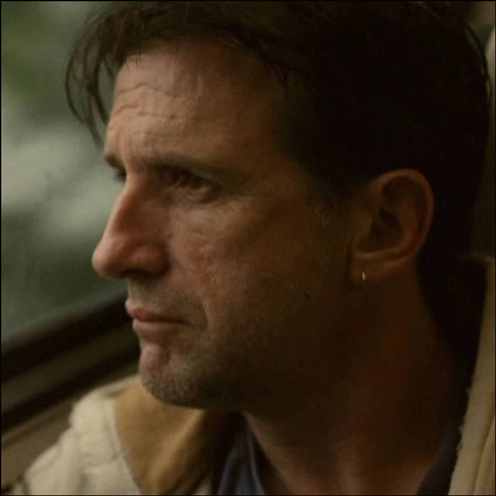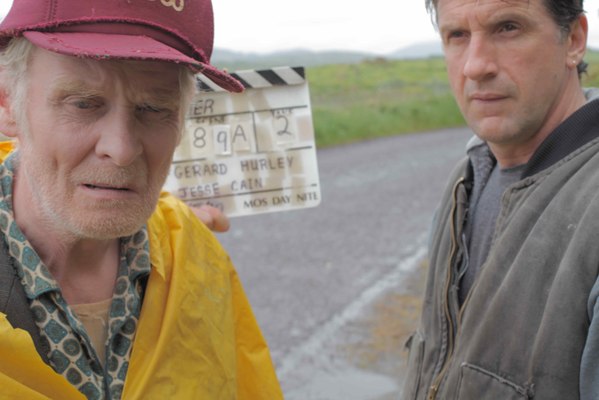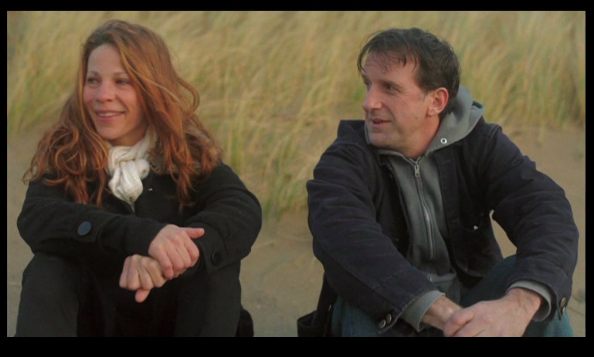In his film The Pier, Gerard Hurley takes a poetic yet unsentimental look at the relationship between a father and son, reuniting in Ireland after many years of silence and separation. Hurley plays the role of the son Jack McCarthy, and this talented jack-of-all-trades wrote the screenplay, directed and produced the film. The Pier will be shown in a festive screening at the Tel Aviv Cinematheque on Tuesday, March 27, 2012 as the opening film of Irish Film Week, with Hurley in attendance.

In anticipation of Hurley’s arrival in Israel, Midnight East had the opportunity to talk with the filmmaker.
Ayelet Dekel: The Pier has the feel of a personal story, I was wondering if there is a relationship between your own experiences and those depicted in the film?
Gerard Hurley: It’s personal story but it’s not autobiographical. It’s personal in the sense that I wanted to honor the part of Ireland that I come from. I really don’t like the way Ireland is portrayed in movies a lot of the time and I felt that I wanted to be true to the people and tradition that I come from, so in that sense it is very personal.
The specifics of the story, touching on subject matters of immigration and the difficulty with the males communicating, I felt that that’s a situation that’s not intrinsic just to Ireland, that’s a universal problem. For males, problems of communicating with one another, especially when it’s emotionally loaded…it’s very easy for males to be angry or to be funny, but to deal with subjects a bit more complex emotionally, it’s very difficult.
AD: What are the kinds of things you don’t like about portrayals of Ireland in film?
GH: I find that I don’t like stereotypes in anything. I think that human beings are very complicated, and we’re all very capable of breaking the mold of generalizations. I wanted to get into an honesty in portraying the people that I know, and where I come from without falling into any clichés that normally surround how Irish people are presented in movies. I think that a lot of times with Irish movies they can either be portrayed as terrorists or drunks you know kind of always the IRA as a backdrop, or the drunken thing, or simple minded people but kind of crafty. There’s a lot more to us as a people and it actually gets a lot more diversified as you go into more regions of Ireland. The Irish don’t fit into one mold – we all don’t get drunk and start shooting at one another or shooting at everything that’s British.
AD: The Pier is your second feature, was it a very different experience for you compared to The Pride (2008)?
GH: The first film I made was about the Irish traveler culture in America, and the Irish traveler or gypsy culture has been going on in America for about 200 years. The story was about domestic abuse from a male perspective. Again for me it was very personal, I wanted to get into exploring that subject matter because growing up I knew a number of people that came from dysfunctional homes.
The movie was a fly on the wall, very realistic very gritty kind of tale, whereas this story [The Pier] is very romantic, in the sense that it’s a mixture of the landscape and the people. The pier is a third character [in the film] and the pride was all about the characters and the surrounding didn’t really matter as much because they were a very isolated community so cinematically I wanted to do it very differently this time because the tone was so different from the first one.
AD: In both films, you were the writer, director, producer and actor. Could you talk about your work process, it’s fairly unusual.
GH: What happened was… I’ve worked at a lot of different things in my lifetime: construction, bar business, I’ve worked as a clown, I’ve done everything and travelled all over the place. I started writing screenplays about twenty years ago – I worked on movie sets and I loved film. So for years I’ve been writing scripts and a number of my screenplays have been optioned and then they fell through, and I just got fed up with it. So about six years ago I said: I’m gonna go out and I’m just going to make a low budget movie myself on credit cards, you know – 50,000 budget or less. I wrote the screenplay [The Pride] for an actor that I knew and he didn’t want to do it because the character was a wife beater and he felt uncomfortable with it. I knew what I wanted from the character, so I decided to play the character myself.
I try for an emotional intensity and I like getting into the real nitty gritty of stuff, and then when you write a character, and then actually bring the character to life, and the real bonus is that you get to interact with your fellow actors and that I love… that whole process I absolutely adore it! So you know what happened was, after I finished the first film, it went around and it was well received so I thought: next time I may want to do this again.

AD: So it starts with the writing…
GH: Oh yeah…I love… I’ve an over-active imagination and I’m always thinking about stories.
AD: Is that the main thing that you seek to convey in the film, the story?
GH: The story is a secondary consideration for me since the characters are more important. In Hollywood movies anyway, there’s a tendency… it’s always about the story, the events. And I’m more intrigued by character than I am by story. If I’m observing someone on the street or on a bus or the subway or whatever my mind starts breaking down the person, I look at what they’re wearing and start thinking about that person. I get very engrossed in personalities and I start wondering where they’re coming from and where they’re going to…I have this tendency to look at minutiae and then worry about the grand scale afterwards.
But when I work I’m very disciplined, with the scope of the projects I do – my first film had a budget of 50,000, the second was 100,000 – I have to plan meticulously. Everything is very precise because I don’t have any time for error. I can’t waste people’s time.
AD: Where did the idea for the Pier originate?
GH: [Avoiding spoilers – Hurley mentions a particular scene in the film] What happens to me, I’ll start thinking… I’ll get sometimes, it’s very emotional. I’ll think about something…and thought of that scene first, without any story.
I just thought the idea of someone spending a lifetime in denial, to me that’s tragic – the amount of people who go through life and they’re not emotionally honest with themselves. I started thinking a lot how sad it is for someone to go through their life completely repressed, feeling like they have to fit into either a mold put on them by society or by themselves and not being able to express their true emotions about things, I think that’s absolutely tragic. So I started thinking first about that scene and then I had to figure out how do I get to that scene and how do I get away from that scene and started thinking about the characters…

AD: You have a wonderful international cast, how did you select the actors?
GH: Lili [Lili Taylor – Grace Ross] I’ve known for years, about 12 years. We’ve always wanted to work together. I’ve written her into past screenplays but they never came through. I wrote this screenplay and then I wasn’t sure who could play the father. A friend in London told me about Karl [Karl Johnson – Larry McCarthy]…I went to see him in a play in Belfast and we met afterwards. After half an hour talking to him I just knew that he was perfect for the role. The rest are local, except June Driscoll [Mary Foskett]. She was in my first movie and I like working with the same people and I like June [actress Mary Foskett] and we work well together. I was lucky it’s a small community down there in South West Cork, but there are a lot of really very talented people.
What does filmmaker Gerard Hurley have to say about the essence of this father-son film?
GH: I think that the core of the story is that it’s all about love at the end of the day and it’s all about women at the end of the day.
The Pier will be shown at the Tel Aviv Cinematheque on Tuesday, March 27th at 21:00; Haifa Cinematheque March 29th; Jerusalem Cinematheque March 31st, Sderot Cinematheque April 5th at 21:00 and Rosh Pina Cinematheque April 5th at 19:30.
For the full list of films & screening times, click here.
Cinematheques:
Tel Aviv Cinematheque, 2 Sprintzak Street, Tel Aviv. 03-6060800
Jerusalem Cinematheque, 11 Hebron Road, Jerusalem, 02-5654356
Haifa Cinematheque, 142 Sderot HaNasi Street, Haifa, 04-8104299/302
Sderot Cinematheque, 4 Hadegel Street, Sderot, 08 – 6849695
Rosh Pina, 04-6801453






[…] Irish Film week will be coming to Israel with a diverse selection of contemporary Irish films. Now in its 13th year, Irish Film Week will take place at the Tel Aviv Cinematheque March 27 – 31, followed by screenings at the Jerusalem, Haifa, Sderot and Rosh Pina cinematheques. Gerard Hurley’s film The Pier will be the opening film, with a festive screening in Tel Aviv in the presence of the director. (Midnight East’s interview with Hurley – click here) […]
[…] insider’s perspective on Israeli culture http://www.midnighteast.com/mag/?p=18450 Share this:TwitterFacebookLike this:LikeBe the first to like this […]
Comments are closed.